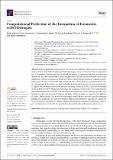Computational Prediction of the Interaction of Ivermectin with Fibrinogen
Author(s)
Vottero, Paola; Tavernini, Scott; Santin, Alessandro D.; Scheim, David E.; Tuszynski, Jack A.; Aminpour, Maral; ... Show more Show less
Downloadijms-24-11449-v2.pdf (9.917Mb)
Publisher with Creative Commons License
Publisher with Creative Commons License
Creative Commons Attribution
Terms of use
Metadata
Show full item recordAbstract
Hypercoagulability and formation of extensive and difficult-to-lyse microclots are a hallmark of both acute COVID-19 and long COVID. Fibrinogen, when converted to fibrin, is responsible for clot formation, but abnormal structural and mechanical clot properties can lead to pathologic thrombosis. Recent experimental evidence suggests that the spike protein (SP) from severe acute respiratory syndrome coronavirus 2 (SARS-CoV-2) may directly bind to the blood coagulation factor fibrinogen and induce structurally abnormal blood clots with heightened proinflammatory activity. Accordingly, in this study, we used molecular docking and molecular dynamics simulations to explore the potential activity of the antiparasitic drug ivermectin (IVM) to prevent the binding of the SARS-CoV-2 SP to fibrinogen and reduce the occurrence of microclots. Our computational results indicate that IVM may bind with high affinity to multiple sites on the fibrinogen peptide, with binding more likely in the central, E region, and in the coiled-coil region, as opposed to the globular D region. Taken together, our in silico results suggest that IVM may interfere with SP–fibrinogen binding and, potentially, decrease the formation of fibrin clots resistant to degradation. Additional in vitro studies are warranted to validate whether IVM binding to fibrinogen is sufficiently stable to prevent interaction with the SP, and potentially reduce its thrombo-inflammatory effect in vivo.
Date issued
2023-07-14Publisher
Multidisciplinary Digital Publishing Institute
Citation
International Journal of Molecular Sciences 24 (14): 11449 (2023)
Version: Final published version